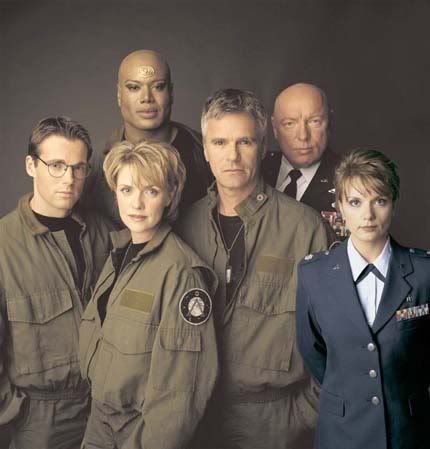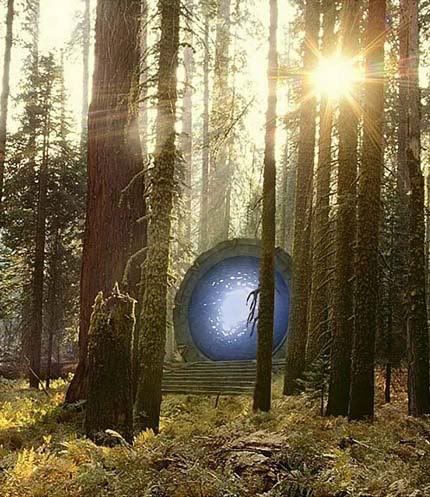 Here is the cast shot for the first season of Stargate SG-1. SG-1 has become one of my top favorite Science Fiction tv shows of all time. At first, I didn't pay it any attention when it came on.
Here is the cast shot for the first season of Stargate SG-1. SG-1 has become one of my top favorite Science Fiction tv shows of all time. At first, I didn't pay it any attention when it came on.I saw the original Stargate movie in the theater, and though I thought it was a solid, B sci-fi movie, I didn't think it was great.
It was built of standard science fiction themes and ideas. An ancient alien transportation device, aliens built the pyramids, secret military base hiding alien technology, grim and troubled military man, eager and innocent young scholarly type, etc...
The movie didn't break any new ground, or surprise me in any way, but it was enjoyable, and it had a visual style and cinematography that was attractive.
I liked it, but I didn't give it much though after it was over. When the tv series was announced, and I heard they picked Richard Dean Anderson, of MacGyver fame, I wasn't thrilled.
I gave up on MacGyver when the guys and I never could get any of his little jerry-rigged devices to work the way they did on the show. I also didn't like the character himself, that may just have been the 80's though.
I started watching Stargate SG-1 during it's third season, because my wife was a MacGyver fan and she insisted. I thought it was only fair, since I had managed to turn her into a fan of Star Trek, Deep Space Nine.
Anderson surprised me. His take on Jack O'Neill was subtle and nuanced and showed a much greater depth of talent than I had given him credit for. We went out and bought the first three seasons on DVD, and then each succeeding season as soon as it was available.
The point of this post is that I see many themes in common between SG-1 and the Sword & Planet style of science fantasy exemplified by Edgar Rice Burroughs John Carter of Mars series, Flash Gordon, Buck Rogers, and many others.
Since this sort of fiction is a part of the pulp and fantasy fiction that colors the origins of The Game, I want to draw it to your attention.
SG-1 can be a mine of good ideas that you can apply to your own Sword & Planet campaign, as well as being a fun and imagination inspiring show in and of itself.
Sword & Planet almost always has a displaced Earth man, somehow transported to, and lost on, an alien world, confronted by alien monsters and strange cultures. The hero must face weird dangers and struggle to understand alien technology while fighting to survive in an unknown world.
Usually, the hero first fights, and then befriends a warlike alien fighter, who becomes his boon companion. There is often an academic, or scholar who provides technical assistance and knowledge, and a beautiful alien princess who fights by his side and provides the love interest for the story.
SG-1 gives this a contemporary treatment.
The hero, Jack O'neill, is part of a team instead of a lone figure. Teal'c, the Jaffa warrior and former First Prime of the System Lord Apophis fills the role of the boon companion. Samantha Carter is both the scientist and the beautiful princess at the same time. She is both Dr Zarchov and Dejah Thoris at once. Daniel Jackson is a combination of the scholar, and the kid side kick who often precipitates events with his rash actions.
Instead of being stuck on a single alien world, SG-1 visits many different worlds. Each one can present different threats and adventures, with the ultimate threat of the System Lords hanging over all.
SG-1 goes home after each adventure, resetting the show for the next one. It's nearly a serialized approach, like Buck Rogers, and also similar to the original Star Trek.
You can see this as similar to the many different cultures Flash Gordon encounters on Mongo, with the Goa'uld taking the place of Ming the Merciless. Or the various peoples of Barsoom that John Carter has to face.
Stargate went on to develop a mythos that's nearly as large and complex as that of Star Trek. It's a possible game universe that has endless possibilities. Nearly immortal aliens posing as gods spread humanity across the galaxy for thousands of years. Hundred of different human cultures from different times isolated and allowed to change to fit their new worlds. Incomprehensible and otherworldly technologies, inscrutable alien races, A DM could do just about anything with this.
The show runners and writers never really took this as far as they could have. I don't really know if they even realized the parallels between what they were doing and Sword & Planet fiction.
Once Anderson lost interest and pulled a Duchovny in season eight, SG- started to lose it's way quickly. Season eight was the first one we didn't run right out and buy, but when seasons nine and ten came along, they made eight look like Shakespeare in the park.
 I liked Stargate Atlantis, but it never quite found it's feet. The whole thing just never quite seemed to gell. Once they started recycling and reimagining SG-1's old foes instead of breaking new ground, it got predictable fast.
I liked Stargate Atlantis, but it never quite found it's feet. The whole thing just never quite seemed to gell. Once they started recycling and reimagining SG-1's old foes instead of breaking new ground, it got predictable fast.The current show, Stargate Universe, is in a word, dreadful. They've taken all the worst elements of mainstream kiddy drama and combined them with the the most off-putting parts of the reimagined Battlestar Galactica. It has that nauseating reality tv camera work, a constant dreary grimness, and a shipload of unsympathetic, disfunctional characters who just seem to wack up against each other in an unending orgy of selfishness and short sightedness.
I really like the Ancient ship itself though, and the Stargate on board is very nice. It looks like a first generation version of the SG-1 stargate.
That's about all that's good about Stargate Universe though. I will note that the standard issue kid genius isn't totally repugnant, as far as characters go. I don't remember his name.
 I saw a few of the game books that where put out for the Stargate SG-1 rpg, but I never got to actually read them. They were priced at over 40 bucks a book at the time, and I didn't buy them. I'm not sure what sort of system they used, and I don't think that system is really as important as the idea and the feel in this case.
I saw a few of the game books that where put out for the Stargate SG-1 rpg, but I never got to actually read them. They were priced at over 40 bucks a book at the time, and I didn't buy them. I'm not sure what sort of system they used, and I don't think that system is really as important as the idea and the feel in this case.There really aren't any elements of the show that haven't appeared in other fiction or rpgs. A Stargate game would really be more a matter of theme and flavor than specific rules for the most part.
If any of you are fans of the show, what system would you use to run an SG-1 game?




4 comments:
> what system?
Depends on the players. I can see a military heavy Twillight 2000, GURPS, Rolemaster game. Or Savage Worlds or d20ish something.
> worst elements of mainstream kiddy drama and combined them with the the most off-putting parts of the reimagined Battlestar Galactica
Glad I'm not the only one to see that.
I played in a Stargate campaign for a while. It was fun, but the group took some time to find its stride and build chemistry.
The very first session, the team traveled through the gate to a developed technological world. For some bizarre reason, everyone dropped into "stealth mode," sneaking around, stealing clothes to blend in and generally acting like there was an imperative not to be noticed by the locals.
Halfway through that session, I realized what was happening and pointed out that the SG-1 way of doing things tends to be more about walking up to the locals and saying, "Hi." It took a while for the mindset to catch on, but that realization did a lot to inform the development of my own character's behavior.
Interesting.
--I see your points as regards S&W themes.
I don't much care for SG-1, and am a devoted Atlantis viewer, and haven't given up on SGU, although I agree the lot is a bit grainy and hard to like. So far I only care about Rush's mind, and Young's bizarre marriage woes.
--The ship so reminds me of the mega-ship in Spelljammer --dunno if that is accurate, but the setting certainly is spot-on.
Best,
My wife is a he-YOOOOOOOGE Stargate fan, and even she isn't that thrilled about SGU. I've stopped watching it.
I'd use D6 or Savage Worlds to run an SG-1 game. TOTALLY.
Post a Comment